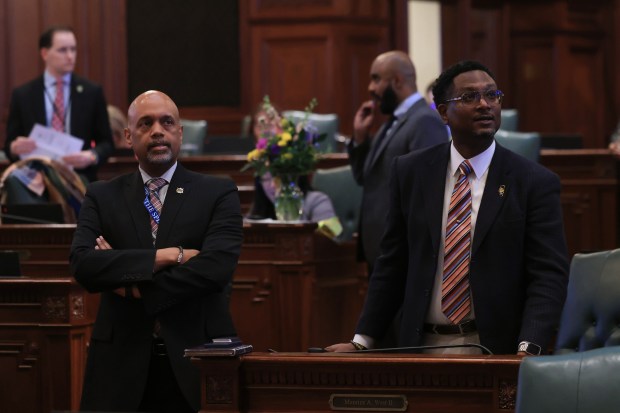It seems like every family has a bit of ancestral folklore, and Joe Dunthorne’s is better than most, a tale of his great-grandfather Siegfried spiriting his family away from Nazi Germany in 1935, followed by a 1936 return during the Berlin Olympics in which they made off with the contents of the home they left behind.
The story begins to unravel as Dunthorne, a writer in search of a story and subject, interviews his grandmother who was part of the escape at age 12, but has a version of the story at odds with the family tale Dunthorne thinks he knows. The furtive escape from Germany to Turkey was on the Orient Express — “two days and nights of eating” — and the return in 1936 was for five weeks of summer fun, including French lessons.
Chagrined, Dunthorne takes it upon himself to unravel the story of Siegfried Merzbacher, a German Jewish chemist who left behind a 2,000-page memoir that somehow ends before sharing the story of his people’s persecution and fleeing to safety. Perhaps this is because, as Dunthorne quickly finds out, his great grandfather spent his career working on projects that resulted in chemical weapons that would one day be used by the Nazi regime that would soon turn genocidal.
“Children of Radium: A Buried Inheritance” is the result of Dunthorne following the trail of his great-grandfather’s life, including visits to Oranienburg, where Siegfried plied his trade, both producing dangerous chemicals and developing gas masks to defend against them. He also visits Ammendorf, another site of experimentation that remains so toxic today it is killing its citizens.
Later, Dunthorne travels to the site of the Dersim massacre, where chemical weapons developed by Siegfried’s employer were used in a genocidal attack on Kurdish Turks in the late 1930s. Dunthorne would like an answer to the question that nags at him: How could a Jewish man live with the fact that his work was turned on innocents, including his own people, while he apparently was able to live safely in exile because of this work?
It would be wrong to say that Dunthorne is in search of “the truth” because he is too perceptive an observer to believe that there are hard, unshifting truths to be found. He goes in search of experience, trying to put himself in the place of his grandfather and others who lived through these times, combing through archives, finding shreds of new information that suggest a fresh path and following along. There is no central mystery to the book, and it is better for it. We’re on a journey.
Very quickly and effectively, Dunthorne brings his characters to life, such as Erich in Ammendorf, who is campaigning for the government to recognize the literal poisoning of the community, and Metin, Dunthorne’s guide in Turkey, who cannot let the authorities know what they are actually up to.
Siegfried remains a mystery to both Dunthorne and the reader until a lucky discovery of a thick file of psychiatric reports from an inpatient stay following what appears to be a nervous breakdown. We learn that Siegfried has indeed paid a cost for his complicity, even as he remained unable to tell his story in his own words.
Dunthorne, the author of numerous books, including the novel “The Adulterants,” which remains a favorite of mine, is an excellent companion throughout, telling the story with a mix of comic timing, wry self-depreciation, and genuine appreciation for the strange and difficult lives people live.
He feels no great guilt over his family legacy, but it is clear he feels a responsibility to tell the story well.
Mission accomplished.
John Warner is the author of books including “More Than Words: How to Think About Writing in the Age of AI.” You can find him at biblioracle.com.
Book recommendations from the Biblioracle
John Warner tells you what to read based on the last five books you’ve read.
1. “West with Giraffes” by Lynda Rutledge
2. “The Demon of Unrest” by Erik Larson
3. “Plainsong” by Kent Haruf
4. “The Only One Left” by Riley Sager
5. “City Primeval” by Elmore Leonard
— Jim K., Wheaton
“Small Mercies” by Dennis Lehane will have the right mix of character depth and plot intrigue to keep Jim invested.
1. “Lives of the Monster Dogs” by Kirsten Bakis
2. “The Phantom Father” by Barry Gifford
3. “Ghosts of Honolulu” by Mark Harmon and Leon Carroll Jr.
4. “Take ‘Er Up Alone, Mister!” by John Joseph Hibbits
5. “Love & Whiskey” by Fawn Weaver
— Mike S., Bolingbrook
I think Mike is a good candidate for Hampton Sides’ “The Wide Wide Sea: Imperial Ambition, First Contact and the Fateful Final Voyage of Captain James Cook.”
1. “Endurance” by Alfred Lansing
2. “Devil in the White City” by Erik Larson
3. “The Wager” by David Grann
4. “Bare-Faced Messiah” by Russell Miller
5. “Knife” by Salman Rushdie
— Daniel M., Buffalo Grove
For Daniel, I’m recommending “The Great Railway Bazaar: By Train Through Asia” by Paul Theroux.
Get a reading from the Biblioracle
Send a list of the last five books you’ve read and your hometown to biblioracle@gmail.com.



